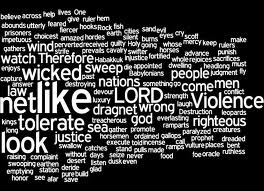While evil exists and prospers and bad things happen even to good people, God is at work and in control beyond what we can sometimes understand. ♦
 It was Habakkuk, a 7th century Hebrew Old Testament prophet, who posed the age-old question to God directly: Why does evil go unpunished? A great question indeed.
It was Habakkuk, a 7th century Hebrew Old Testament prophet, who posed the age-old question to God directly: Why does evil go unpunished? A great question indeed.
But why stop there?
Why do evil people seem to even prosper? Why do bad things happen to good people? Or why do bad things happen at all? Seems fair to ask still today, particularly in light of senseless shootings, death and violence to innocents, and cases of injustice right before us.
A Godly Debate
Habakkuk engages in a dialogue between himself and God. We can learn something from this exchange of sorts. He is a contemporary of Jeremiah and was watching the unfolding national calamity of his beloved Judah’s invasion by the ruthless Chaldeans (Babylonians). His question is how can God allow injustice and wickedness to go unchecked. God tells him that he is doing a work that Habakkuk, if told, would not believe – that he is using the Chaldeans to punish wicked Judah.
Pushed to exasperation, Habakkuk is prompted to ask how God could allow Judah to be punished by a nation more wicked than themselves.
Debate Over
God tells Habakkuk to write the vision down (the result is the Book of Habakkuk). God definitively states that this invasion will happen, slowly but with surety.
Put it in writing, because it is not yet time for it to come true. But the time is coming quickly, and what I show you will come true. And this is the message: ‘Those who are evil will not survive, but those who are righteous will live because they are faithful to God.’ Wealth is deceitful. Greedy people are proud and restless—like death itself they are never satisfied. – Habakkuk 2:3-5
In fact the collapse of Judah came in three sieges beginning in 605 BC and spanning a period of about 20 years. He warns Habakkuk that the “righteous shall live by faith” and that arrogance and greed will not prevail. God confirms that the cruel Chaldeans will get their punishment in due time (within a generation their kingdom was sacked by the Medes and Persians).
Humbled – God’s in Control
In Chapter 3 Habakkuk is left humbled and in prayer that God in wrath would remember mercy. His writing of this short document ends showing full transformation from righteous indignation to a trembling but unwavering, rejoicing faith that God is his Lord God, strength and salvation.
As Habakkuk learned his place, we too see things that don’t make sense and seem so wrong that if we could confront God we also would have some hard questions to ask. The truth is that we are but broken people in a broken world that required a saving grace-filled plan of God played out in Hebrew and human history. The evil and violence do not end on this side of paradise, but we can come to Him in humble faith, even in the midst of tragedy, knowing that indeed God is our Lord, strength and salvation.
___________________________
How long, Lord, must I call for help but you do not listen? Or cry out to you, “Violence!” but you do not save? Why do you make me look at injustice? Why do you tolerate wrongdoing? Destruction and violence are before me; there is strife, and conflict abounds. Therefore the law is paralyzed and justice never prevails. The wicked hem in the righteous so that justice is perverted. (Habakkuk 1:2-4)
Categories: Biblical Character, Evil, Faith, Israel, People, Prophecy, Theology
Great post Mike. Very timely. My highlight: “The truth is that we are but broken people in a broken world that required a saving grace-filled plan of God played out in Hebrew and human history.”
LikeLike